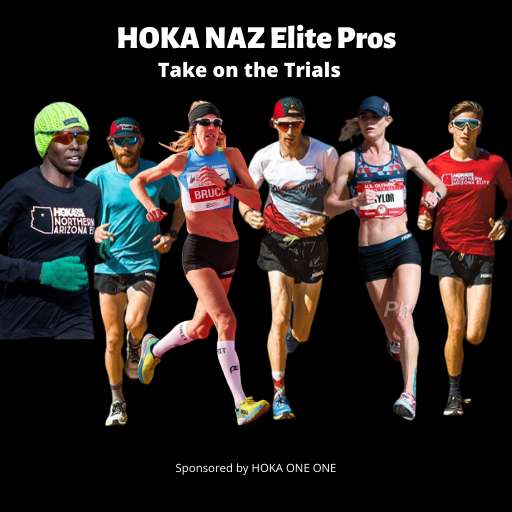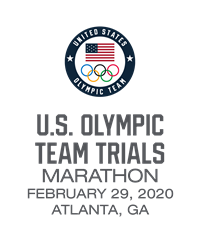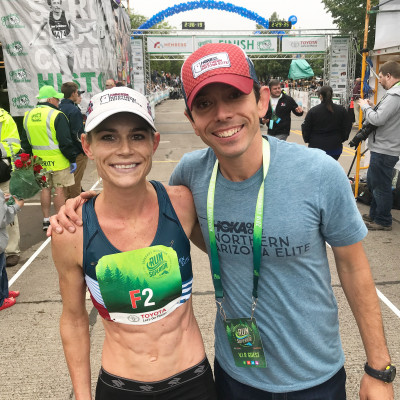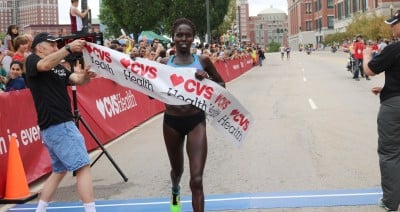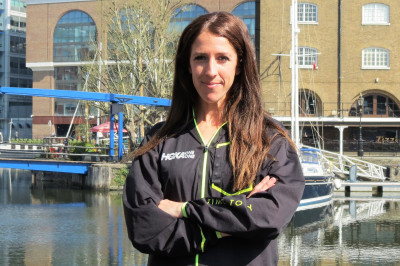2020 Olympic Marathon Trials Preview: The Women’s Underdogs
By Jonathan Gault and Robert Johnson
February 26, 2020
On Monday, we examined the men’s “underdogs” at this weekend’s US Olympic Marathon Trials — athletes who, either through age, inexperience, or the lack of a gaudy personal best are currently on the outside looking in when it comes to an Olympic berth. Now it’s time to perform the same exercise with the women.
The group of underdogs below is still pretty darn talented. It includes an Olympic medalist (Sally Kipyego), a trained firefighter who was third in last year’s USA 10k on the track (Kellyn Taylor), a woman who was 4th in Chicago last year and lives off the grid in Idaho (Emma Ulmer — née Bates), a 42-year-old mother of three who was 6th at Worlds last year (Roberta Groner), and a nine-time US champion who grew up as one of 32 siblings in Kenya (Aliphine Tuliamuk).
Let’s be clear: this is the deepest women’s field ever for the Olympic Trials. Some of these women could absolutely make the team. But they could just as easily get shut out entirely, with the three spots split between LRC’s group of five “favorites”: Des Linden, Molly Huddle, Jordan Hasay, Sara Hall, and Emily Sisson. Everything will be settled in Atlanta on Saturday.
We’ve already touched on this topic on LetsRun — last week, we debated which “longer” shot had the best odds to make the team — so if you haven’t read that article already, check it out before reading this one.
*TV/streaming information *Course map *All LRC 2020 Olympic Trials content
Related LRC Articles:
- LRC Which Woman Is Most Likely To Make The US Olympic Marathon Team?
- LRC Will Jordan Hasay Make the Olympic Team?
- LRC Which “Longer” Shot Has the Best Shot? Kipyego, Bates, Thweatt, Bruce or Tuliamuk
- LRC 2020 Olympic Marathon Trials Preview: The Men’s Underdogs – From Bernard Lagat To Jim Walmsley
The Olympic Medalist
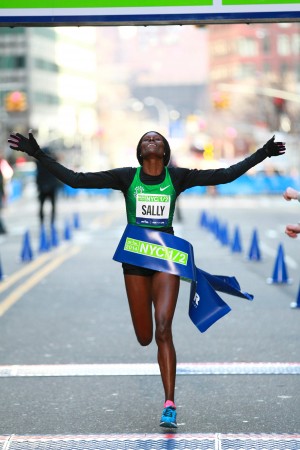 Sally Kipyego — 34 years old, Nike Oregon Track Club Elite, 2:25:10 pb (2019 Berlin), 68:31 half
Sally Kipyego — 34 years old, Nike Oregon Track Club Elite, 2:25:10 pb (2019 Berlin), 68:31 half
Last two marathons: 7th 2019 Berlin (2:25:10), DNF 2019 Boston
Tuneup race: 5th at Discovery Kenya XC on January 26
It’s not hard to make the case for Kipyego, who gained US citizenship in 2017. She has run faster for 5,000 meters (14:30) than any American ever, and owns Olympic and World Championship silver medals at 10,000 meters. In the very first marathon of her career, she finished second in New York in 2016, defeating Molly Huddle. After taking a while to recover from the 2017 birth of her daughter, Emma, she is finally trending upward: she ran 2:25:10 in Berlin last year.
It’s not hard to make the case against Kipyego, either. Her track medals were from 2011 and 2012, and it’s been some time since her actual performances approached that level. Yes, she was second in New York, but that race was over three years ago. And while 2:25:10 isn’t a bad run in Berlin, it’s hard to get too excited about a race in which Kipyego lost to fellow Trials contender Sara Hall by almost three minutes.
Kipyego’s coach Mark Rowland declined LetsRun’s interview request, so we don’t have much information on her buildup, which took place in Kipyego’s native Kenya. (Kipyego did tell Women’s Running: “Everything went well and I feel fantastic. Everything I intended to do, I was able to do.”) Kipyego’s talent gives her a chance, but she’ll need to make a significant leap in fitness from Berlin to contend at the Trials.
From Off the Grid to On the Team?
Emma (Bates) Ulmer — 27 years old, Asics/Idaho Distance Project, 2:25:27 pb (2019 Berlin), 70:48 half
Last two marathons: 4th 2019 Chicago (2:25:27), 1st 2018 CIM (2:28:19)
Ulmer is what we would call a “natural marathoner” — she lives with husband/coach Kameron in rural Idaho in a house with no running water. But she’s also a natural marathoner because she has shown no sign of the struggles that usually accompany a transition to racing 26.2 miles. In her debut, at CIM in 2018, she blasted away from the field early and won handily in 2:28:19. In her next marathon, in Chicago last fall, she sliced almost three minutes off her PR to finish 4th.
If you finish 4th in Chicago five months before the Olympic Trials, you’re a contender to make the team. And if Ulmer can continue on her upward marathon trajectory — she told Women’s Running this buildup was her best yet — she could find herself on the plane to Sapporo.
The NAZ Elite Trio
Flagstaff-based NAZ Elite will have three women in this race — Kellyn Taylor, Aliphine Tuliamuk, and Stephanie Bruce — and NAZ Elite coach Ben Rosario believes this has been a boon to all three, especially Taylor. In Taylor’s best marathons (2018 Grandma’s, 2019 New York), she’s run most of the second half of the race alone. That probably won’t be the case in Atlanta if she is to make the team.
“I think running with Aliphine and Steph all segment — and they really ran almost stride for stride the whole way, everything they did — was good for her,” Rosario says. “Because look, she’s not going to run away from this field. This field is very good and there’s going to be a big pack. So learning how to run in a pack and be comfortable and actually look relaxed next to people instead of rigid and kind of uncomfortable, that was the biggest change, I thought, for her.”
Based on their previous accomplishments, Taylor is the NAZ woman with the best shot at the team, but Rosario believes Tuliamuk and Bruce have made a jump during this segment and that all three women are capable of finishing in the top three.
“At different times I’ve thought oh, Kellyn’s definitely making the team or oh, Aliphine is definitely going to make it or, oh, Steph could win,” Rosario says. “I’ve thought that about all of them, legitimately, during the course of the segment.”
If you want to know the full story of the HOKA NAZ Elite pros, we just dropped a podcast with all of them here: LRC HOKA NAZ Elite Pros Podcast Before the Trials: Can One of them Make the Team!?
Kellyn Taylor — 33 years old, HOKA ONE ONE NAZ Elite, 2:24:29 pb (2018 Grandma’s), 70:16 half
Last two marathons: 7th 2019 New York (2:26:52), 4th 2019 Prague (2:26:27)
Tuneup race: 69:13 to win at Rock ‘n’ Roll Arizona Half (296m short) on January 19
Taylor was 6th at the 2016 Trials in Los Angeles, and followed that up by finishing 4th in the 10,000 at the track trials that summer. She’s shown she can compete with the track specialists on the track — it took everything Emily Sisson had to hold Taylor off in the 10k at USAs last year — and with the marathon specialists in the marathon (she was just six seconds behind Des Linden in New York last fall).
And yet…
Taylor is good on the track, but she’s never made a World or Olympic team. Her PRs (15:19/31:40) are solid, but not sensational. She’s also never been the top American in a World Marathon Major. At 2017 London, she finished three minutes back of Laura Thweatt. At 2017 New York, she was three minutes behind Shalane Flanagan (admittedly, an unfair comparison, since Flanagan won the race), but also 17 seconds behind Allie Kieffer, who is not a serious contender to make the team. She was closer — much closer — to top American honors at 2019 New York, just six seconds, but she still lost to Linden, who has a far better history in the marathon than Taylor.
Rosario says Taylor’s training has gone well — “in terms of her workouts, they were phenomenal; she continues to just get stronger and stronger” — but not everything in Taylor’s life has been smooth recently. Around Christmas time, Taylor was spending sleepless nights in the hospital with her sick foster child and then — equally painfully — had to give up the child and his brother just a few days later. There’s no way to say precisely how that affected Taylor’s running, but it’s an extra stress her rivals will not have dealt with.
If being a foster mom costs Taylor a spot on the Olympic team, it’s a trade she’s willing to make.
“I wouldn’t say that [being a foster mom] is beneficial to my running. I don’t think it falls in line with it at all. If anything, it hurts my running, but I think it’s bigger than running. I think some thing are just bigger than sport,” said Taylor. “You can’t control where the kids are going to end up but while they are with you, you can give them as good of a life as you possibly can. You can give them some stability and love…and hopefully impact them in some sort of way.”
Don’t take that to mean Kellyn Taylor doesn’t very much want to be an Olympian. She views it as a career-definer.
“I think that I would define myself [that way – as an Olympian or not] personally. I know Steph [Bruce] is really big on saying that it won’t define me — like if she makes a team or not. But I’m kind of different, I set very high standards for myself and expect to achieve those things. So if I did not make a team, I think I would walk away disappointed in some ways, but still be proud of some of things that I had done.
“But I think being an Olympian is kind of a career-definer. If a random stranger asks you what you do, one of the first things they ask is, ‘Oh did you go to the Olympics?’ And right now I can be like, ‘I was an alternate.’ That’s fun. It would be cool to say, ‘Yeah I did go to the Olympics.'”
Despite some not great sleep during the first half of this buildup, looking at things as a whole, Taylor told LetsRun on Monday that her buildup has gone well.
“There wasn’t a workout that I didn’t hit. I hit everything… But life was certainly maybe a little bit more busy than normal..But like I said, everything went well. There’s no reason to go out on Saturday and not think I’m just as prepared, if not more prepared, than anyone else that is on the line. If I were going to compare it with my other segments, I’d say it would be right in line with anything else I’ve done. Maybe a few things were better, maybe a few things were not quite as good, but as a whole, it was certainly a good two months.”
Taylor also has been very good during this entire Olympic cycle. It’s not hard to envision her beating Kipyego and Bates. But she’s yet to run a marathon that suggests she should be favored over the likes of Sisson, Huddle, Hasay, and Linden. The good news? She has one more opportunity — the only one that matters, in fact — on Saturday.
Aliphine Tuliamuk — 30 years old, HOKA ONE ONE NAZ Elite, 2:26:50 pb (2019 Rotterdam), 69:16 half
Last two marathons: 12th 2019 New York (2:28:12), 3rd 2019 Rotterdam (2:26:50)
Tuneup race: 69:49 for 19th (7th American) at Houston Half on January 19
The case for Tuliamuk is that she is following the progression of Sara Hall prior to her 2:22 in Berlin: excellent on the roads for several years and gradually improving in the marathon. Tuliamuk has piled up 9 national titles, and dropped her personal best from 2:34 midway through 2017 to 2:26 in Rotterdam last April. Now she just needs that big breakthrough in Atlanta.
Tuliamuk was well back of Taylor and Linden in New York in November, but that isn’t too concerning; she was coming off an abbreviated buildup following a femoral shaft stress fracture. What may be cause to worry, however, is that she was only 19th in her Trials tuneup race at the Houston Half last month. Yes, it was only a tuneup race, but Molly Huddle has admitted she was holding back in that race quite a bit and still beat Tuliamuk by 15 seconds.
However, Tuliamuk told LetsRun on the podcast that the week of Houston was the one week she felt tired during the Trials buildup. It was a chaotic week as she was involved in a car accident as she was headed to a 15 x 1 mile workout. She also ran more than 100 miles that week.
Tuliamuk has beaten some of the Trials favorites on the roads before — she beat Hasay in the US 10k road champs (in Atlanta) in 2017 and Hall at the US Half Champs in 2018 (Tuliamuk also won both races). Her list of scalps at the marathon distance, however, is not nearly as impressive, and she’ll need to claim some big ones to finish in the top three on Saturday.
Her secret weapon, however, could be the fact that she seems to be very good on hills, perhaps because she grew up surrounded by very hilly terrain in Kenya. Tuliamuk told us if she ran three miles from her house in her native Kenya, she might gain 1,000 feet in elevation.
“When I think about this course, I believe that it suits me well…I haven’t had any issues [with hills in practice]. We’ll be running uphill and I’ll feel like everybody else is slowing down and I’ll be like, ‘Why are we slowing down? This is very comfortable,'” said Tuliamuk.
Kellyn Taylor said Tuliamuk finished ahead of her teammates in a 15-mile steady state workout on February 15. Clearly, the training block has gone well for Tuliamuk.
“When I did my last big session last year before Rotterdam, I was struggling and when I finished I was actually tired. But on this one when I finished I was like, ‘I felt great. I can’t believe I just went 16 miles and I averaged four seconds faster than when I did when I was preparing for Rotterdam and those four seconds came on the last four miles of that steady state’. So I am finishing so much stronger and I feel so good and still have energy. I am definitely confident in my training and I really hope that come next week that I will put everything together and have a really good race,” said Tuliamuk.
Stephanie Bruce — 36 years old, HOKA ONE ONE NAZ Elite, 2:27:47 pb (2019 Chicago), 70:44 half
Last two marathons: 6th 2019 Chicago (2:27:47), 2nd 2018 CIM (2:29:20)
Tuneup race: 69:13 for 2nd at Rock ‘n’ Roll Arizona Half (296m short) on January 19
Of the three NAZ Elite women, Bruce is the least likely to make the team. After 10 career marathons, her PR is 2:27:47. And that is telling. Not even five months ago, on a fast course (Chicago) on a good day for running (Brigid Kosgei broke the world record), Bruce could only manage 2:27:47, over two minutes behind Emma Ulmer, who is not even a favorite to make the Olympic team. For Bruce, beating both of her training partners in Atlanta will be tough enough, let alone the dozen-or-so other contenders she’ll need to beat in order to make the team.
If that sounds a bit fatalistic, there are some positives. Taylor and Tuliamuk both have a shot at the team and Bruce is hanging with them in workouts, so she has to have a similar level of fitness. The problem is, Bruce hasn’t always been able to take advantage of that fitness as she’s battled repeated stomach problems that have caused her to struggle with her fueling; it was an issue even during her PR run in Chicago.
But there is a wildcard in Bruce’s back pocket. For this segment, Bruce has hired a nutritionist, who has flown from New York to Flagstaff to help Bruce and will be in Atlanta cooking her meals this weekend. There’s no guarantee it works, but Bruce is giving herself every opportunity to succeed at the Trials.
“I think it’s going to be the best chance she’s had so far to show people how good she really is at the marathon, as long as she doesn’t have the stomach problems,” Rosario says.
She’s Run 2:25 Before
Laura Thweatt — 31 years old, Saucony, 2:25:38 pb (2017 London), 70:12 half
Last two marathons: 8th 2019 Chicago (2:29:06), DNF 2018 Chicago
Tuneup race: 70:12 for 22nd (10th American) at Houston Half on January 19
Three years ago, Thweatt looked as if she’d be a serious contender at the 2020 Trials. She ran a terrific debut in November 2015, clocking 2:28 for 7th in New York, and followed that up with a big PR of 2:25:38 for 6th at 2017 London. But Thweatt’s progress has stalled since then as she’s battled a series of injuries.
Like Tuliamuk, Thweatt is coming off a fairly unimpressive fall marathon result (2:29 in Chicago). Also, like Tuliamuk, Thweatt was limited in her buildup for that race due to an injury (a stress fracture in her heel). If she’s been able to stay healthy during this buildup, she should be much fitter. But going from 2:29 in Chicago to the Olympic team in less than five months is probably too much to ask.
Best of the Rest
It would be a humongous upset if any of these women made the team, but I’ll mention them here just in case.
- Nell Rojas, 32 years old (2:28:09 pb): Rojas, son of former pro Ric, played basketball in addition to track as a high schooler and walked onto her college team at Northern Arizona. She came out of nowhere last year, running 2:28:09 to win the Grandma’s Marathon in June.
- Molly Seidel, 25 years old (debut): The 2015 NCAA champ ran 69:35 at the Houston Half in January and will be making her debut in Atlanta.
- Roberta Groner, 42 years old (2:29:09 pb): It seems crazy to think a woman who finished 6th at Worlds less than five months ago is a total afterthought at the Trials, but that event in the 90-degree heat of Doha was more of a survival test than a race. With normal conditions expected in Atlanta, the inspiring 42-year-old nurse with a 2:29 pb doesn’t have much of a chance at finishing in the top three.
- Lindsay Flanagan, 29 years old (2:28:08 pb): You may not realize it, but Flanagan posted two top-10 finishes in major marathons last year: 9th in Boston, and a pb of 2:28 for 7th in Chicago.
- Allie Kieffer, 32 years old (2:28:12 pb): She was 5th in New York in 2017 and 7th a year later in a pb of 2:28:12, but Kieffer hasn’t done much since to suggest she’ll contend at the Trials (she DNF’d New York in November).
Did you listen to our podcast on the HOKA pros? LRC HOKA NAZ Elite Pros Podcast Before the Trials: Can One of them Make the Team!? You can subscribe and see other podcasts at: letsrun.podcast.com.
